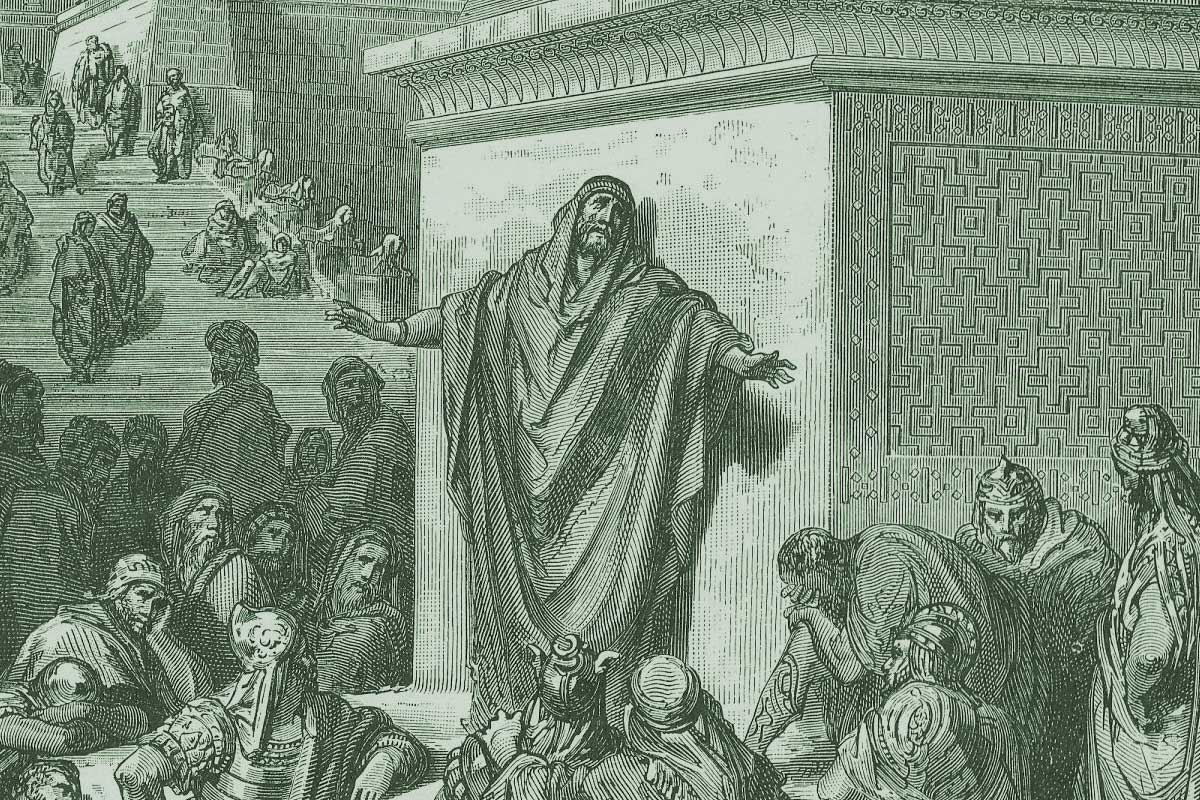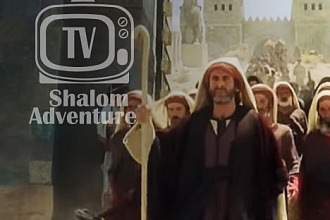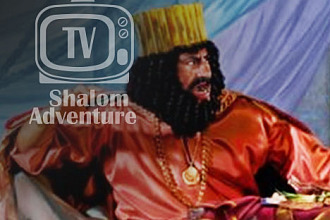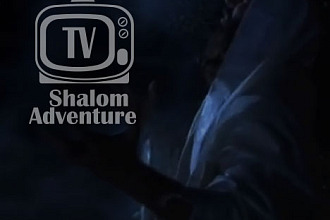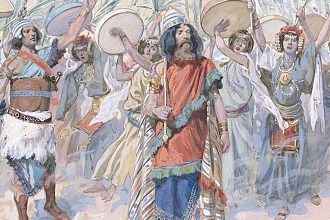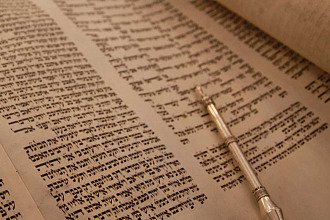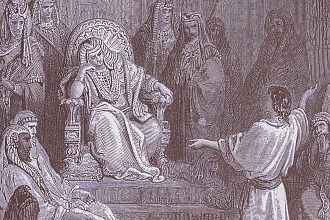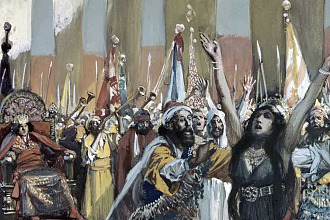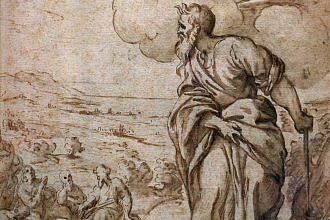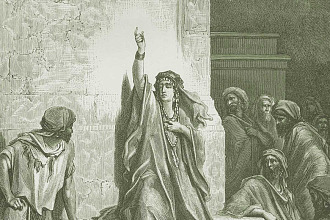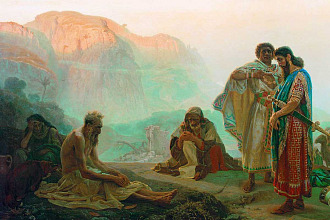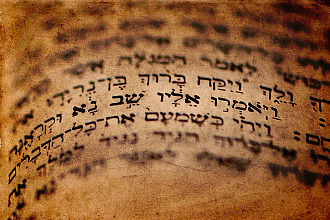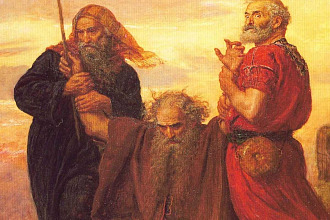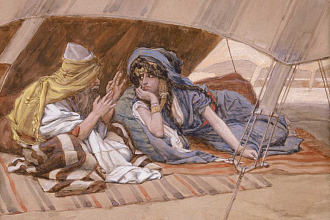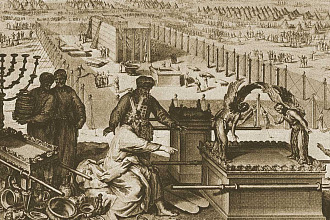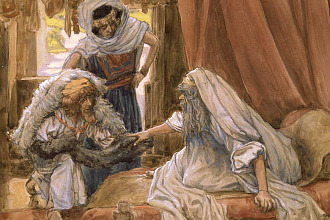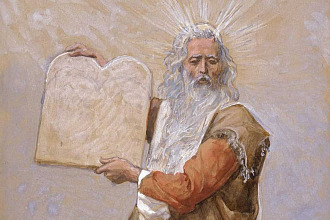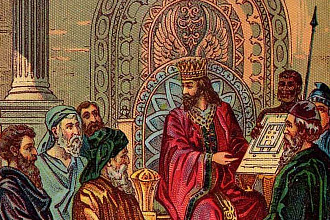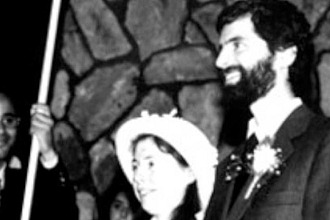Jonah was not exactly a fisherman; he was more like the bait. He did not catch the fish but the fish caught him. Yet his experience teaches us a great lesson.
The wonderful truth we want to explore today is just how eager God is for all the world to hear the story of His love.
1. What did God ask Jonah to proclaim for Him?
The word of the Lord came to Jonah… Go at once to Nineveh, that great city, and proclaim judgment upon it; for their wickedness has come before Me. Jonah 1:1, 2
Nineveh, located in the country of Iraq, is still in existence today.
2. What did Jonah do in response to God’s request?
Jonah, however, started out to flee to Tarshish from the Lord’s service. He went down to Joppa and found a ship going to Tarshish. He paid the fare and went aboard... away from the service of the Lord.Jonah 1:3
Not only did Jonah go away from the service of the Lord, he went 180 degrees in the opposite direction of Nineveh. We might be able to understand Jonah’s fear. Nineveh was a great city, a large city, and a wicked city. Nineveh was not even in the land of Israel. It was not a Jewish city, and the inhabitants were goyim, Gentiles. Jonah would be a foreigner with no national protection. He would be proclaiming to a city that did not believe in his God that his God was going to destroy them. Jonah was called to a very dangerous assignment. You can probably think of some cities in the world that would fit this description. What would you do if God called you to go to one of them and tell them your God said they were going to be destroyed?
3. Instead of allowing Jonah to just run away from the Lord’s service, what did God do for Jonah?
The Lord cast a mighty wind upon the sea, and such a great tempest came upon the sea that the ship was in danger of breaking up. Jonah 1:4
Certainly God could have found someone else just as willing, or unwilling, as Jonah to go to Nineveh. This assignment was as much for Jonah’s benefit as it was for Nineveh, and God, in His love for Jonah, was not going to let him out of this.
4. In their fear of sinking what did the sailors do?
In their fright, the sailors cried out, each to his own god; and they flung the ship’s cargo overboard to make it lighter for them... The men said to one another, “Let us cast lots and find out on whose account this misfortune has come upon us.” They cast lots and the lot fell on Jonah. They said to him, “Tell us, you who have brought this misfortune upon us, what is your business? Where have you come from? What is your country, and of what people are you?” Jonah 1:5, 7, 8
5. How did Jonah respond to the sailors’ questions?
I am a Hebrew,” he replied. “I worship the Lord, the God of Heaven, who made both sea and land.”Jonah 1:9
Did Jonah tell them the truth? Yes and no. Yes, he was a Hebrew, or what we would refer to today as Jewish. Yes, the Lord, the God of Heaven, made both the sea and the land. But no, Jonah was not worshipping Him. It is not possible to worship God and disobey Him at the same time. That applies to us as well. You may be praying, you may be reading this lesson, you may be singing songs of praise to God, you may be attending services, but if you are not obeying God – you are not worshipping Him. Obeying Him would include allowing Him to live in your life to empower you to live the life you have been learning about in this series of Bible studies. I know you have been gratified and enriched as you have seen Him bringing your life into harmony with the great teachings of Scripture. Seeing Him at work within us draws forth an attitude of worship.
Obeying God would also include sharing God’s love with someone else. God has called all of us to be sharing His love with others. We become His hands to help, His feet to go, His mouth to share, His heart to love and care. We become His representatives, His ambassadors. What a privilege to be a representative of the Lord, the God of Heaven, the Creator of the sea and the earth!
6. When Jonah told them he was running away from God the sailors asked him what they could do to calm the storm. How did Jonah respond, showing that he had not yet learned about God’s mercy and forgiveness?
He answered, “Heave me overboard, and the sea will calm down for you; for I know that this terrible storm came upon you on my account.” Jonah 1:12
Jonah seemed to have forgotten the account of Job and that in every calamity God has a purpose planned. Because he did not remember these things, Jonah didn’t realize that this storm was actually for his good. Jonah must have forgotten how God accepted Jacob’s, Moses’, and David’s repentance. He seemed to think the only way to stop the storm was by his death. God did not want Jonah to die. He wanted him to repent of his sin and receive God’s forgiveness through the sacrifices offered in the temple representing the Messiah’s death. God wanted Jonah to accept the power of the Ruach HaKodesh (the Holy Spirit) to take away his fear and cause him to be obedient to God’s will for his life.
7. The sailors resisted such an extreme solution, so they continued to do everything they could to save the boat, but as things continued to get worse these heathen sailors pleaded with God not to hold this act against them, and they heaved Jonah overboard. Immediately the sea became calm. How did these non-Jewish, Goyim (Gentiles), react to this experience?
The men feared the Lord greatly; they offered a sacrifice to the Lord and they made vows. Jonah 1:16
These Gentile sailors became more receptive to God than Jonah had. They tried everything they could to avoid throwing him overboard; and when the storm calmed, they worshipped God, offered a sacrifice, and decided to follow the Lord. Sometimes it is the other way around. People will fear God, offer God everything, and make every kind of promise to God when they are going through a difficult time. But then, after the danger has passed, they forget God and take back their pledges and their promises. Which scenario has been more common in your past? Which scenario has been more common since you have been regularly studying God’s Word?
8. What did God do next to show Jonah that He still loved him and that he still wanted the heathen Gentiles of Nineveh to know about Him?
The Lord provided a huge fish to swallow Jonah; and Jonah remained in the fish’s belly three days and three nights. Jonah prayed to the Lord his God from the belly of the fish. He said: In my trouble I called to the Lord, and He answered me... my prayer came before You, Into Your holy Temple. The Lord commanded the fish, and it spewed Jonah out upon dry land. The word of the Lord came to Jonah a second time: “Go at once to Nineveh, that great city, and proclaim to it what I tell you.” Jonah 2:1-3, 8, 11; 3:1, 2
God did not let Jonah off the hook; He used a fish to catch Jonah. This is not your typical fishing trip, yet Jonah certainly had a whopper of a fish story to tell! God loves us even when we are being disobedient and running away from Him. God did not give up on Jonah or Nineveh and He will not give up on you or me or any of our loved ones.
9. Jonah went to the large, wicked city of Nineveh with the warning that the city would be destroyed within forty days. What did these godless Gentiles of Nineveh do in response to God’s message through Jonah?
The people of Nineveh believed God. They proclaimed a fast, and great and small alike put on sackcloth... [saying] “Who knows but that God may turn and relent? He may turn back from His wrath, so that we do not perish.” Jonah 3:5, 9
The Spirit of God softened the Ninevites’ hearts and they truly repented of their sins. What a powerful experience, and to think that Jonah was reluctant to go! Maybe there is someone you are fearful of sharing God’s love with. You may be thinking, “They are not interested in God. Their life is so far from what the Bible says, they will not accept the truth if I share it with them. They may even get mad at me and reject me if I say anything.” We never know how people will react. God may be moving upon their hearts before you even say a word. If God could turn wicked Nineveh because of the words of fearful, faithless Jonah, certainly He can use you and me.
10. Did the God of Israel show love and mercy to the Gentile people of Nineveh and spare them of the destruction He had pronounced upon them?
God saw what they did, how they were turning back from their evil ways. And God renounced the punishment He had planned to bring upon them, and did not carry it out. Jonah 3:10
What a God of love we serve. His love is for all the earth.
There is more to the account of Jonah. I encourage you to read all of it in Bible (in the book of Jonah).
11. Are there other Gentiles recorded in the Hebrew Scriptures who became believers in the only true God because of the witnessing or proselytizing of Jewish people? Yes. Notice these examples:
- Egyptians who left Egypt with the Israelites during the exodus. Exodus 12:38
- Rahab, an inhabitant of the city of Jericho, who protected the Israelite spies. Joshua 6:25
- The Gibeonites, shortly after the children of Israel crossed the Jordan River into the land of Canaan. Joshua 9:24
- Ruth, a Moabite, was King David’s great grandmother, making her an ancestor of the Messiah. Ruth 4:13-18
- King Nebuchadnezzar, King of Babylon, who was greatly influenced by the Jewish prophet Daniel. Daniel 4:34
From the beginning God has showed His love and compassion for all people of the earth. God had Noah warn the world for 120 years before the flood came. God allowed the people of Sodom and Gomorrah to come in contact with Abraham before they were destroyed. God used Moses to give warnings to the Egyptians and God mercifully gave them ten (10) demonstrations of His power before even one Egyptian died. And God has placed you and me in contact with people whom He wants to know about His love.
12. How many nations were to be blessed by the seed of Abraham?
All the nations (Goyim) of the earth shall bless themselves by your descendants, because you have obeyed My command. Genesis 22:18
All the nations of the earth are blessed by the seed of Abraham? Certainly as a people we have made our contributions to society as a whole, but all the nations of the earth blessed? How can this be? It is through the promised seed, the promised child of the lineage of Abraham, the Messiah, God’s servant, His chosen One. Through the Messiah’s death for the sins of the entire world everyone who has ever lived has had forgiveness of sins available to them. The entire world has been blessed because of the intercession of the Messiah, whether they realize it or not.
13. In what way would Abraham’s descendants, especially the Messiah, bless the other nations?
This is My servant, whom I uphold, My chosen one, in whom I delight. I have put My spirit upon him, He shall teach the true way to the nations (Goyim). Isaiah 42:1
The Lord God will make Victory and renown shoot up in the presence of all the nations (Goyim).Isaiah 61:11
For I am a great King—said the Lord of Hosts—and My name is revered among the nations (Goyim).Malachi 1:14
I will also make you a light of nations (Goyim), that My salvation may reach the ends of the earth.Isaiah 49:6
Note: The word salvation in the last verse has the same Hebrew root as the Messiah’s name. The Hebrew letters for both the word and the name is ישועה. In the name form it is pronounced Yesh-oo’-ah (Y’shua) in Hebrew. God’s salvation has reached the ends of the earth through His Messiah, the Seed of Abraham, Y’shua! Remember in Lesson 1 we learned how all the nations of the world would be blessed by Abraham’s offspring? God loves every person on this planet and He sent the Messiah, Y’shua, from the lineage of Abraham, to die not only for the sins of Jewish people but also for every person on this planet. All the nations of the earth have been blessed because of Abraham’s descendant Y’shua. Y’shua’s death, as the sacrificial lamb, gives every person on this earth the gift of salvation. When we receive His sacrifice for our sins we receive this gift that He has given us.
14. What special promises did God have for foreigners who attached themselves to the Lord?
Thus said the LORD: Observe what is right and do what is just; For soon My salvation shall come, And my deliverance be revealed. Happy is the man who does this, The man who holds fast to it: Who keeps the sabbath and does not profane it, And stays his hand from doing any evil. Let not the foreigner say, Who has attached himself to the LORD, “The LORD will keep me apart from His people… For thus said the LORD: I will give them an everlasting name which shall not perish. As for the foreigners who attach themselves to the LORD, to minister to Him, and to love the name of the LORD, to be His servants—All who keep the sabbath and do not profane it, and who hold fast to My covenant—I will bring them to My sacred mount and let them rejoice in My house of prayer. Their burnt offerings and sacrifices shall be welcome on My altar; for My House shall be called A house of prayer for all peoples. Isaiah 56:1-7
What an interesting promise in the Jewish Bible. “My salvation shall come,” again the root word ישועה the Messiah’s name, is used. Isaiah, the Jewish prophet, says “Happy is… the foreigner (a Gentile)…who keeps the Sabbath…who attaches themselves to the Lord…to be His servants.” They will have an “everlasting name,” they will “not perish,” they will be brought to God’s “sacred mount,” into God’s “house of prayer.” This is why God’s house is called “a house of prayer for all peoples.” We have an inclusive God; He wants us all to be united in Him. The only way this can happen is if we allow God to use us to share His love.
15. In David’s great prayer of repentance what did he promise to do for transgressors after he himself had been purged with hyssop and filled with God’s Spirit?
This purging with hyssop represented the blood of the lambs placed with hyssop on the doorposts during the Passover in Egypt. Those lambs represented the death of the Messiah, who shed His blood for our sins.
“Have mercy upon me, O God, as befits Your faithfulness; in keeping with Your abundant compassion, blot out my transgressions. Wash me thoroughly of my iniquity, and purify me of my sin; for I recognize my transgressions, and am ever conscious of my sin. Purge me with hyssop till I am pure; wash me till I am whiter than snow. Hide Your face from my sins; blot out all my iniquities. Fashion a pure heart for me, O God; create in me a steadfast spirit. Do not cast me out of Your presence, or take Your Holy Spirit away from me. Let me again rejoice in Your help; let a vigorous spirit sustain me. I will teach transgressors Your ways, that sinners may return to You.” Psalm 51:3, 4, 8-15
We have looked at this text several times throughout these lessons. It is a powerful text. Each time we have read it we have focused on a different aspect. In one lesson we focused on the cleansing of our guilt and sin through the blood of the lambs. Another time we focused on the Holy Spirit. This time we want to focus on David’s assertion that after he was forgiven of his sins and had God’s Spirit empowering Him, he would teach other sinners how to receive forgiveness. Telling others about God’s Messiah and forgiveness is a very Jewish thing to do. It was done by King David, Abraham, Moses, Jonah, Isaiah, and throughout the Jewish Bible.
16. According to Psalm 14:3 how many of us have sinned against God?
All have turned bad, altogether foul; there is none who does good, not even one. Psalm 14:3
Everyone needs forgiveness. Everyone needs the Messiah. God needs us to share with them.
17. Can people, as transgressors of God’s ways, just turn from sin on their own strength?
Who can say, “I have cleansed my heart, I am purged of my sin”? “Can the Ethiopian change his skin, Or the leopard his spots? Just as much can you do good, Who are practiced in doing evil!”Proverbs 20:9; Jeremiah 13:23
Neither you nor I have the ability to purge ourselves of our sins without the forgiveness of God, provided by the death of the Messiah, and the power of God, provided by His Spirit in our lives. How, then, can we expect people to be good, kind, and fair, when they do not even know about our merciful God’s power to set them free from their sins? Just think, if we as a people had done more in sharing God’s love over the last 6,000 years with people who do not know of His forgiveness and power to transform their lives, there would be much less crime, violence, and immorality today.
All the nations of the earth were to be blessed by Abraham’s seed. They were to be blessed with knowledge of and experience with the God of Abraham. If we do not teach others about the power of God to change their lives, who will? If all the nations were like the “happy foreigners” that “keep the Sabbath” and worship together with us in “God’s house of prayer for all nations” which Isaiah talks about in Isaiah 56 (question 14), then we would not have had all the persecution that we have had all these years. How will they learn about our God who loves them and can change them if we do not tell them about Him.
18. What did God say about those who tell others of His love?
How welcome on the mountain are the footsteps of the herald announcing happiness, heralding good (news), announcing victory, telling Zion, “Your God is King!” Isaiah 52:7
When you are experiencing freedom from guilt and are having victory over sin, it is just so exciting that it is impossible to keep it in. You want everyone to know what God has done in your life, and you want them to be as happy as you are. Chances are your family and friends are already noticing the positive changes taking place in your life and are wondering how it can happen for them also. Don’t be afraid to tell them.
Do you know who the youngest king of Israel was? It would be quite an experience to be a king. But imagine being a king at the age of seven. This young boy is another interesting person in the Hebrew Scriptures with wonderful lessons for us to learn from his life. In your next lesson, "The Youngest King of Israel," you will also learn how to get hold of one of the most important areas of your life and how to excel in it.
This lesson is adapted from "Jewish Discoveries," by Jeff Zaremsky, to buy the printed book, click here.

